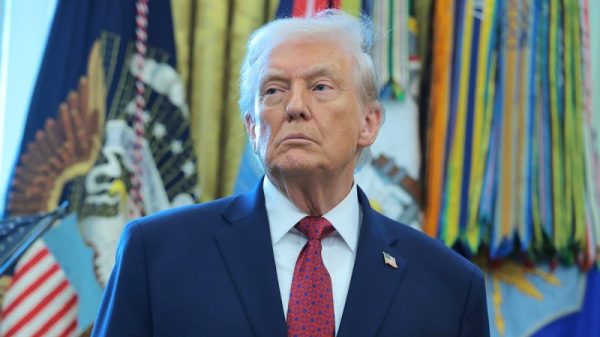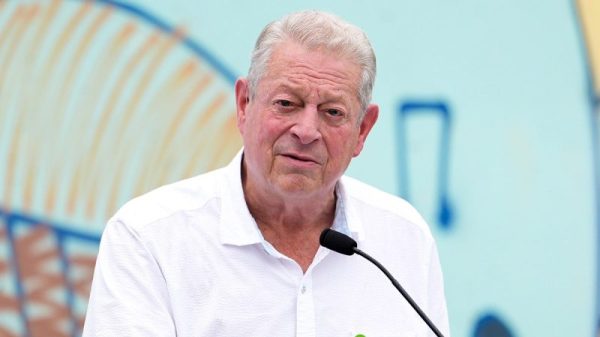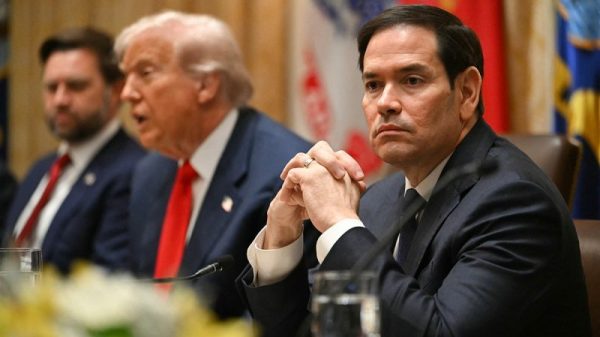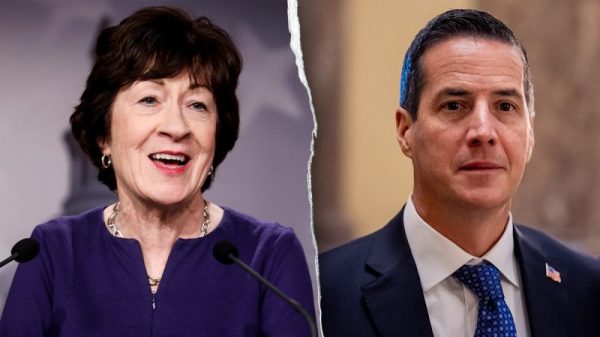When 2024 dawned, the presidential race appeared destined to play out as much in the courts as on the campaign trail.
Former president Donald Trump faced a pair of federal indictments. Two state cases brought the total criminal charges against him to 91. Challenges to his ballot eligibility proliferated, with the Supreme Court being asked to weigh in on whether Trump could even be a candidate.
Two months later, the federal cases have been slowed to the point where verdicts before November are considered unlikely. One of the state cases has been derailed by a sex scandal. The other is due to go to trial later this month, but is widely seen as the least significant of the bunch.
And the challenge to Trump’s ballot eligibility was settled decisively Monday, with the Supreme Court unanimously ruling that states lack the power to disqualify him.
To anyone hoping that Trump’s efforts to overturn the last election would lead the judicial system to meaningfully penalize him before the next one, recent developments have proved sobering.
“The real takeaway is that the courts aren’t going to save us from ourselves,” said Stephen Vladeck, a professor at the University of Texas School of Law, “and that the only surefire way to ensure that an anti-democratic candidate for president doesn’t succeed is to beat him at the ballot box.”
While the court had been widely expected to rule in Trump’s favor, the decision came amid a string of setbacks in efforts to hold Trump accountable for his efforts to disrupt the transfer of power after the 2020 vote. Trump is also outpolling President Biden in many head-to-head matchups and continues to dominate the Republican primary, with the chance to put the intra-party contest effectively out of reach on Tuesday as 15 states cast ballots.
The court’s 9-0 decision overturned a December ruling from Colorado’s Supreme Court, which barred Trump from appearing on the state’s ballot under Section 3 of the 14th Amendment. The Civil War-era provision prohibits those who have taken an oath to the Constitution and then engaged in insurrection from holding office again. The Colorado court cited Trump’s role in the events around the Jan. 6, 2021, insurrection as the basis for its decision.
Trump is the first former president to have been charged with a crime. He is facing four separate cases, two of which relate to his efforts to overturn the 2020 election.
All nine justices — the six conservatives plus the three liberals — said an individual state should not be able to ban a candidate from running for federal office. They warned of the consequences of a nationwide patchwork in which candidates were barred in some states but not others.
“Nothing in the Constitution requires that we endure such chaos — arriving at any time or different times, up to and perhaps beyond the inauguration,” the court said in an unsigned, 13-page opinion.
The push to disqualify Trump under the seldom-used Section 3 had divided constitutional scholars, with some championing the case and others expressing doubts about either the legality or the practical impact of keeping Trump from running — or both.
Mark Graber, a University of Maryland constitutional law scholar who last year published a book on the history of the 14th Amendment, said the justices appeared focused on the real-world implications of a ban but that the legal basis of the decision was thin.
“The opinion makes sense as a matter of policy,” Graber said.
While it might be “a good idea to have a rule that states cannot disqualify federal officers or candidates for federal office,” Graber said, there is nothing in the text of the Fourteenth Amendment that says that “states can disqualify state officers, but not federal officers.”
J. Michael Luttig, a conservative former U.S. Court of Appeals judge who co-wrote with Laurence H. Tribe a piece for the Atlantic in August that helped to galvanize interest in the 14th Amendment as a means to disqualify Trump, cited the language of the three liberal justices in their concurring opinion, which critiqued elements of the majority’s decision. The liberals agreed with the conservatives that states should be prohibited from kicking candidates off the presidential ballot under Section 3, while disagreeing with the majority specifying Congress’s role in any disqualification. The standard, Luttig argued, makes it functionally impossible to disqualify insurrectionists from holding federal office.
“The court today decided that no person in the future will ever be disqualified under Section 3 of the 14th Amendment regardless of whether he or she has engaged in insurrection or rebellion against the Constitution of the United States,” Luttig said. “The decision is stunning in its overreach.”
The impact of Monday’s decision was immediate, effectively nullifying efforts in states across the country to ban Trump from running. Within hours of the ruling, Maine Secretary of State Shenna Bellows withdrew her earlier determination that Trump should be barred from the ballot in her state. The Maine primary is Tuesday.
In comments shortly after the ruling, Trump praised the court’s decision and quickly pivoted to another case “of equal importance” before the court, one reviewing his sweeping claim of immunity from prosecution over actions taken while president. The Supreme Court agreed last week to review Trump’s arguments in that matter, setting oral arguments for late April. The decision was a blow to special counsel Jack Smith’s efforts to move the federal Jan. 6 case quickly to trial, and cast doubt over whether there will be a verdict before the November election.
Trump allies cheered the Monday ruling. “The Supreme Court unanimously showed us today that we cannot silence the voice of the American people and stop democracy,” Alina Habba, one of Trump’s attorneys, wrote in a post on X, formerly known as Twitter.
The court pointedly did not address whether Trump engaged in insurrection. In Colorado, Secretary of State Jena Griswold (D) said that while she welcomed the clarity the decision would give millions of Americans preparing to vote, she said she was “disappointed” by the ruling.
“It means that federal oath-breaking candidates will have a pass to run for office again given the nonfunctioning in Congress,” she said.
Former Colorado House and Senate majority leader Norma Anderson, a Republican who was a plaintiff in the case, said the court’s ruling “does not change this fact: Donald Trump engaged in insurrection against the United States Constitution.”
She added that she now believes that “the court cases against Donald Trump do nothing to hinder him. The thing to do is to get to the ballot box.”
The sentiment was echoed by Biden’s deputy campaign manager Quentin Fulks. In an appearance on MSNBC, he said that, “we don’t really care,” about the Colorado decision. “Our focus since day one of launching this campaign has been to defeat Donald Trump at the ballot box.”
Asked about the case in December, Biden said it was “self-evident” that Trump was an insurrectionist — though he stopped short of saying how the court should rule. “Now, whether the 14th Amendment applies, I’ll let the court make that decision,” the president told reporters. “But he certainly supported an insurrection. No question about it. None. Zero.”
Still, Biden has framed much of his bid for reelection around the idea that he is uniquely positioned to protect the nation’s democracy by defeating Trump and preventing him from returning to the Oval Office. Biden’s aides and allies have described the prospect of a second Trump term as an existential threat to Americans’ fundamental freedoms and sense of security — a message they believe they can deliver more effectively when it becomes clear that neither the courts nor the Republican primary will keep the former president off the ballot in November.
Biden and his allies say they are eager for another one-on-one matchup between the two men that will again offer voters a stark choice.
“I’m the only one who has ever beat him,” Biden told the New Yorker in an interview published Monday. “And I’ll beat him again.”
When 2024 dawned, the presidential race appeared destined to play out as much in the courts as on the campaign trail.
Former president Donald Trump faced a pair of federal indictments. Two state cases brought the total criminal charges against him to 91. Challenges to his ballot eligibility proliferated, with the Supreme Court being asked to weigh in on whether Trump could even be a candidate.
Two months later, the federal cases have been slowed to the point where verdicts before November are considered unlikely. One of the state cases has been derailed by a sex scandal. The other is due to go to trial later this month, but is widely seen as the least significant of the bunch.
And the challenge to Trump’s ballot eligibility was settled decisively Monday, with the Supreme Court unanimously ruling that states lack the power to disqualify him.
To anyone hoping that Trump’s efforts to overturn the last election would lead the judicial system to meaningfully penalize him before the next one, recent developments have proved sobering.
“The real takeaway is that the courts aren’t going to save us from ourselves,” said Stephen Vladeck, a professor at the University of Texas School of Law, “and that the only surefire way to ensure that an anti-democratic candidate for president doesn’t succeed is to beat him at the ballot box.”
While the court had been widely expected to rule in Trump’s favor, the decision came amid a string of setbacks in efforts to hold Trump accountable for his efforts to disrupt the transfer of power after the 2020 vote. Trump is also outpolling President Biden in many head-to-head matchups and continues to dominate the Republican primary, with the chance to put the intra-party contest effectively out of reach on Tuesday as 15 states cast ballots.
The court’s 9-0 decision overturned a December ruling from Colorado’s Supreme Court, which barred Trump from appearing on the state’s ballot under Section 3 of the 14th Amendment. The Civil War-era provision prohibits those who have taken an oath to the Constitution and then engaged in insurrection from holding office again. The Colorado court cited Trump’s role in the events around the Jan. 6, 2021, insurrection as the basis for its decision.
Trump is the first former president to have been charged with a crime. He is facing four separate cases, two of which relate to his efforts to overturn the 2020 election.
All nine justices — the six conservatives plus the three liberals — said an individual state should not be able to ban a candidate from running for federal office. They warned of the consequences of a nationwide patchwork in which candidates were barred in some states but not others.
“Nothing in the Constitution requires that we endure such chaos — arriving at any time or different times, up to and perhaps beyond the inauguration,” the court said in an unsigned, 13-page opinion.
The push to disqualify Trump under the seldom-used Section 3 had divided constitutional scholars, with some championing the case and others expressing doubts about either the legality or the practical impact of keeping Trump from running — or both.
Mark Graber, a University of Maryland constitutional law scholar who last year published a book on the history of the 14th Amendment, said the justices appeared focused on the real-world implications of a ban but that the legal basis of the decision was thin.
“The opinion makes sense as a matter of policy,” Graber said.
While it might be “a good idea to have a rule that states cannot disqualify federal officers or candidates for federal office,” Graber said, there is nothing in the text of the Fourteenth Amendment that says that “states can disqualify state officers, but not federal officers.”
J. Michael Luttig, a conservative former U.S. Court of Appeals judge who co-wrote with Laurence H. Tribe a piece for the Atlantic in August that helped to galvanize interest in the 14th Amendment as a means to disqualify Trump, cited the language of the three liberal justices in their concurring opinion, which critiqued elements of the majority’s decision. The liberals agreed with the conservatives that states should be prohibited from kicking candidates off the presidential ballot under Section 3, while disagreeing with the majority specifying Congress’s role in any disqualification. The standard, Luttig argued, makes it functionally impossible to disqualify insurrectionists from holding federal office.
“The court today decided that no person in the future will ever be disqualified under Section 3 of the 14th Amendment regardless of whether he or she has engaged in insurrection or rebellion against the Constitution of the United States,” Luttig said. “The decision is stunning in its overreach.”
The impact of Monday’s decision was immediate, effectively nullifying efforts in states across the country to ban Trump from running. Within hours of the ruling, Maine Secretary of State Shenna Bellows withdrew her earlier determination that Trump should be barred from the ballot in her state. The Maine primary is Tuesday.
In comments shortly after the ruling, Trump praised the court’s decision and quickly pivoted to another case “of equal importance” before the court, one reviewing his sweeping claim of immunity from prosecution over actions taken while president. The Supreme Court agreed last week to review Trump’s arguments in that matter, setting oral arguments for late April. The decision was a blow to special counsel Jack Smith’s efforts to move the federal Jan. 6 case quickly to trial, and cast doubt over whether there will be a verdict before the November election.
Trump allies cheered the Monday ruling. “The Supreme Court unanimously showed us today that we cannot silence the voice of the American people and stop democracy,” Alina Habba, one of Trump’s attorneys, wrote in a post on X, formerly known as Twitter.
The court pointedly did not address whether Trump engaged in insurrection. In Colorado, Secretary of State Jena Griswold (D) said that while she welcomed the clarity the decision would give millions of Americans preparing to vote, she said she was “disappointed” by the ruling.
“It means that federal oath-breaking candidates will have a pass to run for office again given the nonfunctioning in Congress,” she said.
Former Colorado House and Senate majority leader Norma Anderson, a Republican who was a plaintiff in the case, said the court’s ruling “does not change this fact: Donald Trump engaged in insurrection against the United States Constitution.”
She added that she now believes that “the court cases against Donald Trump do nothing to hinder him. The thing to do is to get to the ballot box.”
The sentiment was echoed by Biden’s deputy campaign manager Quentin Fulks. In an appearance on MSNBC, he said that, “we don’t really care,” about the Colorado decision. “Our focus since day one of launching this campaign has been to defeat Donald Trump at the ballot box.”
Asked about the case in December, Biden said it was “self-evident” that Trump was an insurrectionist — though he stopped short of saying how the court should rule. “Now, whether the 14th Amendment applies, I’ll let the court make that decision,” the president told reporters. “But he certainly supported an insurrection. No question about it. None. Zero.”
Still, Biden has framed much of his bid for reelection around the idea that he is uniquely positioned to protect the nation’s democracy by defeating Trump and preventing him from returning to the Oval Office. Biden’s aides and allies have described the prospect of a second Trump term as an existential threat to Americans’ fundamental freedoms and sense of security — a message they believe they can deliver more effectively when it becomes clear that neither the courts nor the Republican primary will keep the former president off the ballot in November.
Biden and his allies say they are eager for another one-on-one matchup between the two men that will again offer voters a stark choice.
“I’m the only one who has ever beat him,” Biden told the New Yorker in an interview published Monday. “And I’ll beat him again.”





















